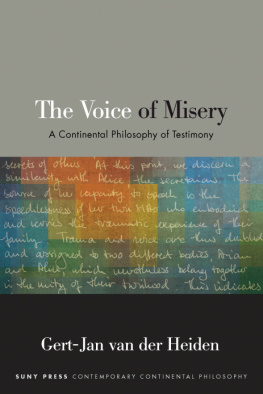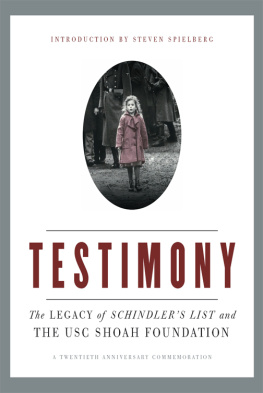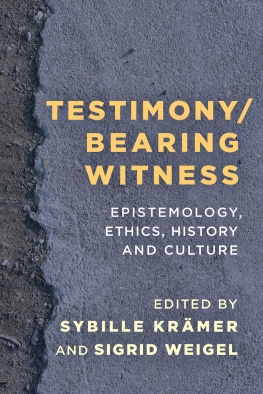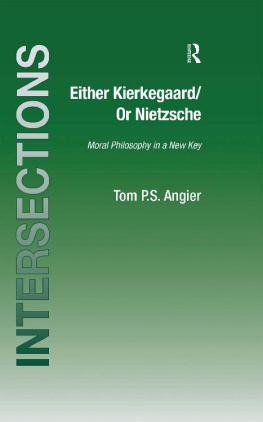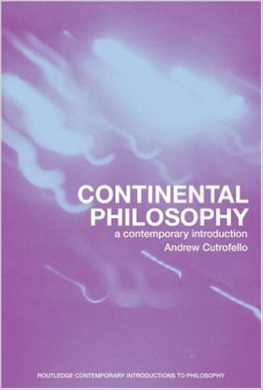The Voice
of Misery
SUNY series in Contemporary Continental Philosophy
Dennis J. Schmidt, editor
The Voice
of Misery
A Continental Philosophy of Testimony
Gert-Jan van der Heiden
Published by State University of New York Press, Albany
2019 State University of New York Press
All rights reserved
Printed in the United States of America
No part of this book may be used or reproduced in any manner whatsoever without written permission. No part of this book may be stored in a retrieval system or transmitted in any form or by any means including electronic, electrostatic, magnetic tape, mechanical, photocopying, recording, or otherwise without the prior permission in writing of the publisher.
For information, contact State University of New York Press, Albany, NY
www.sunypress.edu
Library of Congress Cataloging-in-Publication Data
Names: Heiden, Gerrit Jan van der, 1976 author.
Title: The voice of misery : a continental philosophy of testimony / Gert-Jan van der Heiden.
Description: Albany : State University of New York, 2020. | Series: SUNY series in contemporary Continental philosophy | Includes bibliographical references and index.
Identifiers: LCCN 2019011267 | ISBN 9781438477619 (hardcover : alk. paper) | ISBN 9781438477626 (ebook)
Subjects: LCSH: Testimony (Theory of knowledge) | Continental philosophy.
Classification: LCC BD238.T47 H45 2020 | DDC 121/.3dc23
LC record available at https://lccn.loc.gov/2019011267
10 9 8 7 6 5 4 3 2 1
Why have you left the light of the sun and come here to behold the dead and the place where there is no joy?
Homer, The Odyssey XI.9394
Id prefer to be at the threshold
Book of Psalms 84:10
Contents
P ART I.
T O G IVE A V OICE: S IX L ITERARY E XPERIMENTS
P ART II.
A D ISTINCTIVE S ENSE OF T ESTIMONY
P ART III.
O N THE T HRESHOLD OF B EING AND L ANGUAGE
Acknowledgments
I would like to express my gratitude to the Freiburg Institute for Advanced Studies (FRIAS) for its hospitality that allowed me to work on parts of this study in Spring 2015. Especially, I would like to thank Gnter Figal for supporting my stay there. Im grateful for my home department, the Faculty of Philosophy, Theology and Religious Studies of Radboud University, for offering me the opportunity to continue working on this study in Fall 2016.
I would like to thank Dennis Schmidt for supporting the publication of this book in the SUNY series in Contemporary Continental Philosophy. I would like to thank Andrew Kenyon from SUNY for his advice in the process of publication and in fine-tuning the manuscript to its current form.
An earlier version of was published as To Speak for the Speechless: On Erwin Mortiers While the Gods Were Sleeping , International Yearbook of Hermeneutics 17 (2018): 8494.
Introduction
And what else is left to resist with but the debt which each soul has contracted with the miserable and admirable indetermination from which it was born and does not cease to be born? [] This debt to infancy is one which we never pay off. [] It is the task of writing, thinking, literature, arts, to venture to bear witness to it.
Lyotard, Linhumain , 15/7
Philosophy did not begin to reflect on the meaning of bare existence with the present-day concept of la nuda vita , bare life. In fact, this idea has a long history. If one were interested in writing this history, one could, for instance, start with Plato and his use of the adjective gumnos . If one followed the political philosophical reverberation of bare life as addressed today, one could begin with a reference to Laws , which describes how perpetrators of a crime in a temple, if they are slaves or foreigners, are to be cast out naked beyond the borders of the country.
Yet Plato uses gumnos also beyond the confines of political philosophy. In the Sophist , for instance, the word is used to describe what is set apart or stripped bare aprmmenon from other beings. When addressing the bare soul, the interlocutors in the Gorgias or the Republic do not offer a logos , an argument or statement concerning, for instance, a dualism of psuch and sma . Rather, the bare soul can apparently only be borne witness to in an exceptional testimony, which is offered by the muthoi because the bare soul, the poor ending and miserable provenance of all life, is only encountered in the land of the dead, which is inaccessible to the living.
With this sense of the bare soul, we are approaching the sense of bare existence that motivates this study on testimony. It is motivated by the following question: how to experience or bear witness to the soul deprived of body and all living conditions? It is not a coincidence that in the Gorgias , the bare soul is only addressed in a myth; and a description of the souls ultimate trial over the past life and pivotal choice for the life to come is offered to us at the end of the Republic in the soldier Ers testimony of the realm in which the dead, bare souls are gathered. This testimony, this mythical attestation articulates in the discourse of the living that which cannot be experienced by the living themselves, but which is nevertheless attested to be the experience of the bare soulsas well as up to a certain point, as I explain, the experience of the soldier and guard who is positioned at the threshold of life and death. Apparently, the notion of bareness refers to an ontological depth in Platos thought that requires a distinctive form of testimony to be made known.
Another Platonic myth that uses the adjective gumnos does not locate bare existence on the other side of human life but rather at its very inception, that is, at the event of the birth of humankind. Nevertheless, the sense of gumnos of that which remains after human life is stripped Yet it also means that the human is the creature who is always indebted to the miserable state of its infancy and that the gifts of logos and the other technai are first and foremost given as response and attestation to the bare existence from which human life unfolds.
Thus, according to this myth, logos is only a supplement to the humans natural condition of infancy and bare existence, the miserable [] indetermination from which it was born, as Lyotard suggests. When he writes in the passage that I used as an epigraph to this introduction that it is the task of thinking and literature to bear witness to this bare existence, which withdraws itself from the self-experience of the humans who understand themselves as always already having language and the arts, it makes sense to read the Protagoras , the Gorgias , and the Republic as offering such testimonies in the exceptional form of muthoi . These testimonies are of crucial importance because they reflect a dimension of bare existence at the heart of human life, which is forgotten and erased from human memory and experience as soon as the gift of logos is received or, in the case of the bare soul as depicted in the myth of Er, the souls new turn of life has started. Only in these testimonies is this dimension of existence preserved and guarded, announced and made known.
What ifthus are the stakes of this studywe begin to understand testimony proceeding from the task to bear witness to the bare existence at the heart of human life? What if this dimension of existence were set apart from our common human experience and from our common human discourse or logos because the latter is somehow denied access to the realm of bare existence?

